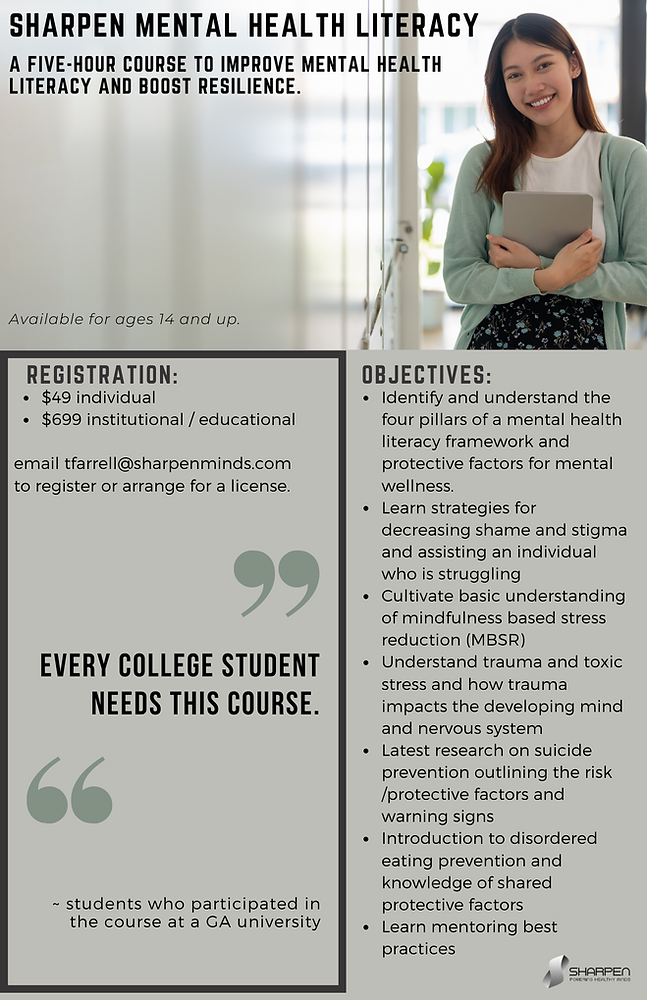The Importance Of Mental Health Literacy Education In Schools And Communities

Table of Contents
The Benefits of Mental Health Literacy Education in Schools
Equipping students with the knowledge and skills to understand and manage their mental health is paramount. School-based mental health literacy education programs offer numerous benefits:
Improved Understanding of Mental Health Conditions
Teaching students about common mental health conditions like anxiety disorders and depression symptoms is foundational. Understanding the signs and symptoms of conditions such as generalized anxiety disorder, panic disorder, social anxiety disorder, major depressive disorder, and bipolar disorder allows for early identification of potential issues. This improved mental health awareness empowers students to recognize these conditions not just in others, but also in themselves.
- Increased empathy: Learning about the lived experiences of those struggling with mental health challenges cultivates empathy and reduces the potential for misunderstanding and stigmatization.
- Reduced stigma: Education helps to dismantle harmful stereotypes surrounding mental illness, creating a more inclusive and supportive school environment.
- Early identification of potential issues: Recognizing symptoms early can lead to timely intervention and support, preventing more serious problems from developing.
Developing Help-Seeking Behaviors
Mental health literacy education is not just about understanding mental health conditions; it's about empowering students to seek help when they need it. This involves:
- Knowing where to find resources: Students need to be aware of the mental health resources available to them, such as school counselors, school psychologists, and readily available helplines. Providing clear pathways to accessing these resources is crucial.
- Understanding the process of seeking professional help: Educating students about the steps involved in seeking professional help, including navigating insurance or accessing free community clinics, can alleviate anxieties surrounding help-seeking.
- Overcoming barriers to seeking help: Addressing common barriers like fear of judgment, lack of awareness of resources, and misconceptions about mental health treatment is essential to encouraging help-seeking behaviors.
Promoting Positive Mental Well-being
Beyond addressing mental health challenges, education can equip students with proactive strategies to promote their overall mental wellbeing.
- Mindfulness exercises: Teaching techniques like meditation and deep breathing can help students manage stress and improve emotional regulation.
- Stress reduction strategies: Educating students on healthy coping mechanisms for stress, such as physical activity, spending time in nature, or engaging in hobbies, is vital for building resilience.
- Healthy lifestyle choices: Promoting healthy eating habits, sufficient sleep, and regular exercise reinforces the connection between physical and mental health.
- Resilience building: Equipping students with strategies to cope with adversity and bounce back from setbacks is a crucial aspect of fostering positive mental well-being. This includes teaching problem-solving skills and emotional regulation.
The Role of Mental Health Literacy Education in Communities
Extending mental health literacy education beyond schools to encompass the broader community is crucial for creating a society that supports mental wellbeing.
Reducing Stigma and Increasing Understanding
Community-based mental health awareness campaigns play a vital role in challenging negative perceptions of mental illness.
- Public awareness campaigns: Utilizing various media platforms to disseminate accurate information and promote understanding can significantly reduce stigma.
- Community events: Organizing workshops, seminars, and support groups can create safe spaces for dialogue and information sharing.
- Workshops for parents and caregivers: Equipping parents and caregivers with the knowledge and tools to support their children's mental health is critical.
Empowering Families and Caregivers
Supporting families and caregivers is crucial in addressing the mental health needs of individuals.
- Recognizing warning signs: Education can enable family members to recognize early warning signs of mental health challenges and seek timely intervention.
- Providing support and encouragement: Knowing how to offer effective support and encouragement without invalidating someone's experience is essential for family members.
- Accessing resources: Familiarity with local community mental health resources, such as support groups and clinics, can significantly improve the ability to provide adequate care.
Strengthening Community Resources and Support Networks
Building strong community resources and support networks is vital in providing accessible and effective mental health support.
- Mental health clinics: Ensuring the availability of accessible and affordable mental health clinics is critical.
- Support groups: Creating safe spaces for individuals and families to connect and share their experiences can be incredibly powerful.
- Online resources: Leveraging technology to provide accessible online resources and support networks can expand reach and accessibility.
- Community partnerships: Collaborations between schools, healthcare providers, community organizations, and government agencies are crucial in building a comprehensive network of support.
Conclusion
Mental health literacy education is not simply an educational initiative; it's a societal imperative. By improving understanding of mental health conditions, reducing stigma, promoting help-seeking behaviors, and fostering positive mental well-being, we can build healthier, more supportive communities. We urge you to invest in mental health literacy by contacting your local school boards, volunteering with mental health organizations, and supporting initiatives that promote mental health education. Let's work together to create a world where everyone has access to the support they need and deserves. Let's champion mental health literacy and build a brighter future for all.

Featured Posts
-
 Two Celebrity Traitors Stars Exit Bbc Show Amidst Turmoil
May 02, 2025
Two Celebrity Traitors Stars Exit Bbc Show Amidst Turmoil
May 02, 2025 -
 Exclusive Which A Lister Wants Access To Melissa Gorgas Beach House
May 02, 2025
Exclusive Which A Lister Wants Access To Melissa Gorgas Beach House
May 02, 2025 -
 Urgent Action Needed Nrc Condemns Anti Muslim Plots In Bangladesh
May 02, 2025
Urgent Action Needed Nrc Condemns Anti Muslim Plots In Bangladesh
May 02, 2025 -
 Techiman South Parliamentary Election Court Dismisses Ndc Petition
May 02, 2025
Techiman South Parliamentary Election Court Dismisses Ndc Petition
May 02, 2025 -
 The Harry Potter Remake 6 Crucial Elements For Success
May 02, 2025
The Harry Potter Remake 6 Crucial Elements For Success
May 02, 2025
Latest Posts
-
 Les Tuche 5 Le Film Et Ses Dedicaces
May 03, 2025
Les Tuche 5 Le Film Et Ses Dedicaces
May 03, 2025 -
 Un Violon A L Ecran La Matinale Avec Mathieu Spinosi
May 03, 2025
Un Violon A L Ecran La Matinale Avec Mathieu Spinosi
May 03, 2025 -
 Les Tuche 5 A Qui Se Consacre Ce Nouvel Opus
May 03, 2025
Les Tuche 5 A Qui Se Consacre Ce Nouvel Opus
May 03, 2025 -
 Katapolemisi Tis Diafthoras Stis Poleodomies Bimata Pros Tin Epanidrysi Enos Apotelesmatikoy Kratoys
May 03, 2025
Katapolemisi Tis Diafthoras Stis Poleodomies Bimata Pros Tin Epanidrysi Enos Apotelesmatikoy Kratoys
May 03, 2025 -
 Emission Matinale Mathieu Spinosi Joue Du Violon
May 03, 2025
Emission Matinale Mathieu Spinosi Joue Du Violon
May 03, 2025
